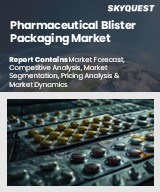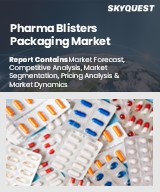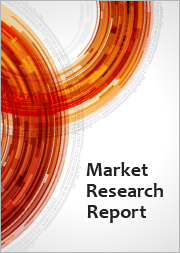
|
시장보고서
상품코드
1772674
의약품 블리스터 포장 시장 규모, 점유율, 성장 분석, 유형별, 재료별, 최종 용도별, 기술별, 지역별 - 산업 예측(2025-2032년)Pharmaceutical Blister Packaging Market Size, Share, and Growth Analysis, By Type (Primary Packaging, Bottles), By Material (Glass, Aluminum Foil), By End Use, By Technology, By Region -Industry Forecast 2025-2032 - Industry Forecast 2025-2032 |
||||||
의약품 블리스터 포장 세계 시장 규모는 2023년 207억 달러로 평가되었고 예측 기간(2025-2032년) CAGR은 7.6%로, 2024년 217억 달러에서 2032년에는 389억 9,000만 달러로 성장할 전망입니다.
세계 의약품 블리스터 포장 시장은 제약 및 헬스케어 산업의 성장에 힘입어 크게 성장하고 있습니다. 안전성, 변조 방지 및 효율적인 포장 솔루션에 대한 수요가 증가함에 따라 블리스터 포장은 내구성, 용량 정확성 및 가시성 때문에 가장 선호되는 선택이 되고 있습니다. 주목할 만한 트렌드로는 지속 가능한 혁신의 추진을 들 수 있는데, 제조업체들은 규제 요건과 환경적 고려사항에 따라 친환경, 재활용 가능, 생분해성 옵션을 개발하고 있습니다. 또한, 소규모 제약사들은 첨단 기술, 업무 효율성 및 서비스 향상을 위해 위탁 포장 기관과의 제휴를 모색하고 있습니다. 또한, 포장 공정에 인공지능을 통합하여 정확도를 높이고 다운타임을 줄이는 한편, 스타트업들은 자동화 및 스마트 기술을 통해 이 분야를 재정의하고 시장의 혁신을 더욱 촉진하고 있습니다.
목차
서론
- 조사 목적
- 조사 범위
- 정의
조사 방법
- 정보 조달
- 2차와 1차 데이터 방법
- 시장 규모 예측
- 시장 전제조건과 제한
주요 요약
- 세계 시장 전망
- 공급과 수요 동향 분석
- 부문별 기회 분석
시장 역학과 전망
- 시장 개요
- 시장 규모
- 시장 역학
- 성장 촉진요인과 기회
- 성장 억제요인과 과제
- Porter의 Five Forces 분석
주요 시장 인사이트
- 중요 성공 요인
- 경쟁 정도
- 주요 투자 기회
- 시장 생태계
- 시장의 매력 지수(2024년)
- PESTEL 분석
- 거시경제 지표
- 밸류체인 분석
- 가격 분석
- 규제 상황
- 사례 연구
- 기술 분석
의약품 블리스터 포장 시장 규모 : 재료별&CAGR(2025-2032)
- 시장 개요
- 폴리염화비닐(PVC)
- 폴리염화비닐리덴(PVDC)
- 폴리에틸렌(PE)
- 폴리에틸렌테레프탈레이트(PET)
- 알루미늄
- 기타
의약품 블리스터 포장 시장 규모 : 기술별&CAGR(2025-2032)
- 시장 개요
- 냉간 성형
- 열 성형
- 기타
의약품 블리스터 포장 시장 규모 : 최종 이용 산업별&CAGR(2025-2032)
- 시장 개요
- 의약품
- 뉴트라슈티컬
- 의료기기
- 화장품
- 기타
의약품 블리스터 포장 시장 규모 : 지역별&CAGR(2025-2032)
- 북미
- 미국
- 캐나다
- 유럽
- 독일
- 스페인
- 프랑스
- 영국
- 이탈리아
- 기타 유럽
- 아시아태평양
- 중국
- 인도
- 일본
- 한국
- 기타 아시아태평양
- 라틴아메리카
- 브라질
- 기타 라틴아메리카
- 중동 및 아프리카
- GCC 국가
- 남아프리카공화국
- 기타 중동 및 아프리카
경쟁 정보
- 주요 5개사 비교
- 주요 기업의 시장 포지셔닝(2024년)
- 주요 시장 기업이 채택한 전략
- 최근 시장 동향
- 기업의 시장 점유율 분석(2024년)
- 주요 기업 개요
- 기업 상세
- 제품 포트폴리오 분석
- 기업 부문별 점유율 분석
- 매출 전년대비 비교(2022-2024년)
주요 기업 개요
- Amcor plc(Switzerland)
- Constantia Flexibles(Austria)
- WestRock Company(United States)
- Tekni-Plex, Inc.(United States)
- Huhtamaki Oyj(Finland)
- Sonoco Products Company(United States)
- Winpak Ltd.(Canada)
- ACG Pharmapack Pvt. Ltd.(India)
- Aptar CSP Technologies Inc.(United States)
- The Dow Chemical Company(United States)
- Honeywell International Inc.(United States)
- Klockner Pentaplast(Luxembourg)
- Bilcare Research Inc.(India)
- Rohrer Corporation(United States)
- Bemis Company Inc.(United States)
- UFlex Limited(India)
- SUDPACK(Germany)
- Stevanato Group(Italy)
- Gerresheimer AG(Germany)
- PGP Glass(India)
결론과 제안
LSH 25.07.23Global Pharmaceutical Blister Packaging Market size was valued at USD 20.7 billion in 2023 and is poised to grow from USD 21.7 billion in 2024 to USD 38.99 billion by 2032, growing at a CAGR of 7.6% in the forecast period (2025-2032).
The global pharmaceutical blister packaging market is experiencing significant growth driven by the expansion of the pharmaceutical and healthcare industries. The increasing demand for safe, tamper-evident, and efficient packaging solutions has made blister packaging a top choice due to its durability, dosage accuracy, and visibility. A notable trend includes the push for sustainable innovations with manufacturers developing eco-friendly, recyclable, and biodegradable options that align with regulatory requirements and environmental concerns. Additionally, small pharmaceutical companies are seeking partnerships with contract packaging organizations to capitalize on advanced technology, operational efficiencies, and improved service offerings. Furthermore, the integration of artificial intelligence in packaging processes enhances precision and reduces downtime, while startups are redefining the sector through automation and smart technologies, further driving market innovation.
Top-down and bottom-up approaches were used to estimate and validate the size of the Global Pharmaceutical Blister Packaging market and to estimate the size of various other dependent submarkets. The research methodology used to estimate the market size includes the following details: The key players in the market were identified through secondary research, and their market shares in the respective regions were determined through primary and secondary research. This entire procedure includes the study of the annual and financial reports of the top market players and extensive interviews for key insights from industry leaders such as CEOs, VPs, directors, and marketing executives. All percentage shares split, and breakdowns were determined using secondary sources and verified through Primary sources. All possible parameters that affect the markets covered in this research study have been accounted for, viewed in extensive detail, verified through primary research, and analyzed to get the final quantitative and qualitative data.
Global Pharmaceutical Blister Packaging Market Segments Analysis
Global Pharmaceutical Blister Packaging Market is segmented by Type, Material, Technology and region. Based on Type, the market is segmented into Primary Packaging and Secondary Packaging and Tertiary Packaging. Based on Material, the market is segmented into Plastics & Polymers, Paper & Paperboard, Glass, Aluminium Foil and Others. Based on Technology, the market is segmented into Cold Forming and Thermoforming. Based on region, the market is segmented into North America, Europe, Asia Pacific, Latin America and Middle East & Africa.
Driver of the Global Pharmaceutical Blister Packaging Market
The pharmaceutical industry serves as a crucial driving force behind the growth of the global blister packaging market. As advancements in drug delivery systems progress, there is a marked shift toward unit-dose packaging that guarantees accurate dosages, reduces potential contamination, and fosters improved patient adherence to medication regimens. Blister packs provide essential features such as tamper evidence, safeguarding the product, and facilitating user-friendly handling, positioning them as an ideal choice for both prescription and over-the-counter medications. Additionally, the increasing aging population, along with a surge in chronic health conditions and the development of healthcare infrastructures in emerging economies, further propels the demand for blister packaging solutions.
Restraints in the Global Pharmaceutical Blister Packaging Market
While blister packaging presents various benefits, it requires considerable investment in advanced manufacturing equipment, premium materials, and strict quality control measures. The integration of sustainable and innovative technologies additionally escalates production expenses, posing challenges for small and medium-sized manufacturers, particularly in budget-conscious markets. Additionally, the volatility in the prices of raw materials such as aluminum, PVC, and bioplastics can result in unpredictable costs, further complicating the financial landscape for these producers. Consequently, these factors collectively act as significant constraints, hindering growth and competitiveness in the global pharmaceutical blister packaging market.
Market Trends of the Global Pharmaceutical Blister Packaging Market
The Global Pharmaceutical Blister Packaging market is witnessing a notable trend towards smart and connected packaging solutions. As the industry embraces technological advancements, manufacturers are increasingly integrating digital features like QR codes, RFID tags, and NFC chips into blister packs. This evolution not only enhances product authentication and traceability but also fortifies efforts against counterfeit drugs, ensuring safety and integrity. Additionally, these smart solutions facilitate remote monitoring of patient adherence, crucial in managing chronic diseases and supporting telemedicine initiatives. By harnessing real-time data on usage patterns, pharmaceutical companies can inform future product development, aligning with the growing demand for patient-centric healthcare solutions.
Table of Contents
Introduction
- Objectives of the Study
- Scope of the Report
- Definitions
Research Methodology
- Information Procurement
- Secondary & Primary Data Methods
- Market Size Estimation
- Market Assumptions & Limitations
Executive Summary
- Global Market Outlook
- Supply & Demand Trend Analysis
- Segmental Opportunity Analysis
Market Dynamics & Outlook
- Market Overview
- Market Size
- Market Dynamics
- Drivers & Opportunities
- Restraints & Challenges
- Porters Analysis
- Competitive rivalry
- Threat of substitute
- Bargaining power of buyers
- Threat of new entrants
- Bargaining power of suppliers
Key Market Insights
- Key Success Factors
- Degree of Competition
- Top Investment Pockets
- Market Ecosystem
- Market Attractiveness Index, 2024
- PESTEL Analysis
- Macro-Economic Indicators
- Value Chain Analysis
- Pricing Analysis
- Regulatory Landscape
- Case Studies
- Technological Analysis
Global Pharmaceutical Blister Packaging Market Size by Material Type & CAGR (2025-2032)
- Market Overview
- Polyvinyl Chloride (PVC)
- Polyvinylidene Chloride (PVDC)
- Polyethylene (PE)
- Polyethylene Terephthalate (PET)
- Aluminum
- Others
Global Pharmaceutical Blister Packaging Market Size by Technology & CAGR (2025-2032)
- Market Overview
- Cold Forming
- Thermoforming
- Others
Global Pharmaceutical Blister Packaging Market Size by End Use Industry & CAGR (2025-2032)
- Market Overview
- Pharmaceuticals
- Nutraceuticals
- Medical Devices
- Cosmetics
- Others
Global Pharmaceutical Blister Packaging Market Size & CAGR (2025-2032)
- North America (Material Type, Technology, End Use Industry)
- US
- Canada
- Europe (Material Type, Technology, End Use Industry)
- Germany
- Spain
- France
- UK
- Italy
- Rest of Europe
- Asia Pacific (Material Type, Technology, End Use Industry)
- China
- India
- Japan
- South Korea
- Rest of Asia-Pacific
- Latin America (Material Type, Technology, End Use Industry)
- Brazil
- Rest of Latin America
- Middle East & Africa (Material Type, Technology, End Use Industry)
- GCC Countries
- South Africa
- Rest of Middle East & Africa
Competitive Intelligence
- Top 5 Player Comparison
- Market Positioning of Key Players, 2024
- Strategies Adopted by Key Market Players
- Recent Developments in the Market
- Company Market Share Analysis, 2024
- Company Profiles of All Key Players
- Company Details
- Product Portfolio Analysis
- Company's Segmental Share Analysis
- Revenue Y-O-Y Comparison (2022-2024)
Key Company Profiles
- Amcor plc (Switzerland)
- Company Overview
- Business Segment Overview
- Financial Updates
- Key Developments
- Constantia Flexibles (Austria)
- Company Overview
- Business Segment Overview
- Financial Updates
- Key Developments
- WestRock Company (United States)
- Company Overview
- Business Segment Overview
- Financial Updates
- Key Developments
- Tekni-Plex, Inc. (United States)
- Company Overview
- Business Segment Overview
- Financial Updates
- Key Developments
- Huhtamaki Oyj (Finland)
- Company Overview
- Business Segment Overview
- Financial Updates
- Key Developments
- Sonoco Products Company (United States)
- Company Overview
- Business Segment Overview
- Financial Updates
- Key Developments
- Winpak Ltd. (Canada)
- Company Overview
- Business Segment Overview
- Financial Updates
- Key Developments
- ACG Pharmapack Pvt. Ltd. (India)
- Company Overview
- Business Segment Overview
- Financial Updates
- Key Developments
- Aptar CSP Technologies Inc. (United States)
- Company Overview
- Business Segment Overview
- Financial Updates
- Key Developments
- The Dow Chemical Company (United States)
- Company Overview
- Business Segment Overview
- Financial Updates
- Key Developments
- Honeywell International Inc. (United States)
- Company Overview
- Business Segment Overview
- Financial Updates
- Key Developments
- Klockner Pentaplast (Luxembourg)
- Company Overview
- Business Segment Overview
- Financial Updates
- Key Developments
- Bilcare Research Inc. (India)
- Company Overview
- Business Segment Overview
- Financial Updates
- Key Developments
- Rohrer Corporation (United States)
- Company Overview
- Business Segment Overview
- Financial Updates
- Key Developments
- Bemis Company Inc. (United States)
- Company Overview
- Business Segment Overview
- Financial Updates
- Key Developments
- UFlex Limited (India)
- Company Overview
- Business Segment Overview
- Financial Updates
- Key Developments
- SUDPACK (Germany)
- Company Overview
- Business Segment Overview
- Financial Updates
- Key Developments
- Stevanato Group (Italy)
- Company Overview
- Business Segment Overview
- Financial Updates
- Key Developments
- Gerresheimer AG (Germany)
- Company Overview
- Business Segment Overview
- Financial Updates
- Key Developments
- PGP Glass (India)
- Company Overview
- Business Segment Overview
- Financial Updates
- Key Developments


















